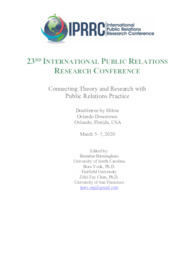What Brazil does when nature calls: applying situational theory of problem solving for coalition-building for sustainable agricultural practice for brazilian farmers.
What Brazil does when nature calls: applying situational theory of problem solving for coalition-building for sustainable agricultural practice for brazilian farmers.
Author(s): FAVARIN, A. M.; KIM, J.-K.; LIMA, A. L. S. de; FARIA, G. R.; ANTUNES, J. M.; CASTRO, M. A. de; RODRIGUES, R. de A. R.
Summary: Brazil initiated national actions toward sustainable farming in response to climate change. Qualitative studies were conducted using Situational Theory of Problem Solving (STOPS) to understand how farmers and stakeholders recognize problems and constraints in their solution adoption. A model practice of strategic communication is presented for the change agents in sustainable agriculture practice worldwide.
Publication year: 2020
Types of publication: Paper in annals and proceedings
Unit: Embrapa Maize & Sorghum
Observation
Some of Embrapa's publications are published as ePub files. To read them, use or download one of the following free software options to your computer or mobile device. Android: Google Play Books; IOS: iBooks; Windows and Linux: Calibre.
Access other publications
Access the Agricultural Research Database (BDPA) to consult Embrapa's full library collection and records.
Visit Embrapa Bookstore to purchase books and other publications sold by Embrapa.

